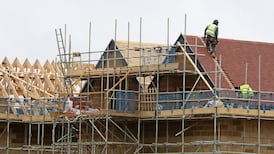The pound has come under renewed speculative attack, echoing events last April when there was a serious run on the currency. There was little sign of the pressure to come yesterday morning. The pound was gaining slightly against both sterling and the deutschemark. Then, almost £50 million was sold in three minutes at around 4 o'clock and the pound began falling. It dropped from
88.45p against sterling to 87.3p shortly afterwards.
Mr Colin Hunt, economist at Bank of Ireland, warned of the dangers. "There is a danger that this sort of activity could have a snowball affect and draw others in to do the same thing," he warned. "And last time we had sustained selling we had an interest rate increase."
However, he still did not expect a rate rise in the near term. "But these moves must be causing some unease in the Central Bank."
The pound is now at its lowest level against sterling since 1989, although still some way off its low over the past decade of around 82p, reached when sterling surged during the Lawson boom.
At one stage, just before the January 1993 devaluation, the pound was as high as 110p. Since last August it has dropped by almost 16 per cent from a high of over 104p.
It is understood that much of yesterday's selling, which came to as much as
£80 million, came from the US. The scale of the moves had been so large earlier that some market participants had thought the Bank of France or Central
Bank were intervening.
Mr Hunt also warned that there was considerable appetite for currency speculation around the world at the moment. Many Far Eastern currencies and the
New Zealand dollar have been targeted, with large profits made in recent times.
"In this environment there must be worries that the Irish pound could attract international speculators," Mr Hunt said. If this were to happen, the
Government could find it very difficult to stem the tide. In April, the Central
Bank spent £1.1 billion defending the currency, before it was forced to stop.
Mr Hunt pointed out that monetary policy moves are unlikely to be able to help. Nevertheless an interest rate hike is possible as the authorities would have to be seen to be doing something if the currency were to come under significant pressure.
The other option would be to indicate there was still a good possibility that the pound would be entering the single currency at a rate significantly above the currency central rate of DM2.41, Mr Dermot O'Brien chief economist at NCB
pointed out.
However, Dr Dan McLaughlin, chief economist at Riada Stockbrokers, insisted that while there was a risk of increased currency speculation it was also possible that we may be heading into a period of increasing deutschmark strength.
Yesterday, the Bundesbank only set its "repo" rate - its key money market rate - for two weeks, despite the fact that its next meeting is not for four weeks.
Such a move would traditionally be seen as the first indication of rate rises. In addition, over recent days German three-month rates have increased.
"If the markets come to believe that German rate rises are possible we could see the deutschmark strengthening against most currencies, even sterling. So while we might fall against the deutschmark we may pick up against sterling," Dr
McLaughlin added.
He said German rate rises could also lead to increased currency volatility across European currencies, with the pound becoming less of a focus.
He also noted that yesterday's speculation occurred after 3.30p.m. when the
Central Bank had left the market. "It will be interesting to see what they do if it happens earlier in the day when they are active," he said.
If the pound does fall against both currencies there are undoubtedly inflationary dangers. Mr Jim O'Leary, chief economist at Davy Stockbrokers, pointed out that the Department of Finance's forecast for inflation of 2 per cent this year implies a rise to almost 3 per cent by the end of the year.
"Because of base affects (the rises being so low so far this year) that could lead to a rapid acceleration next year.









